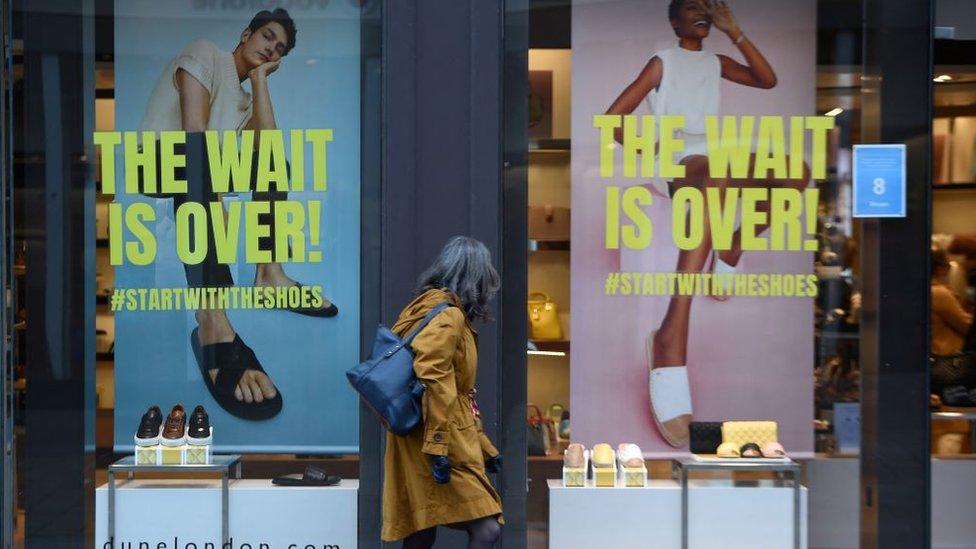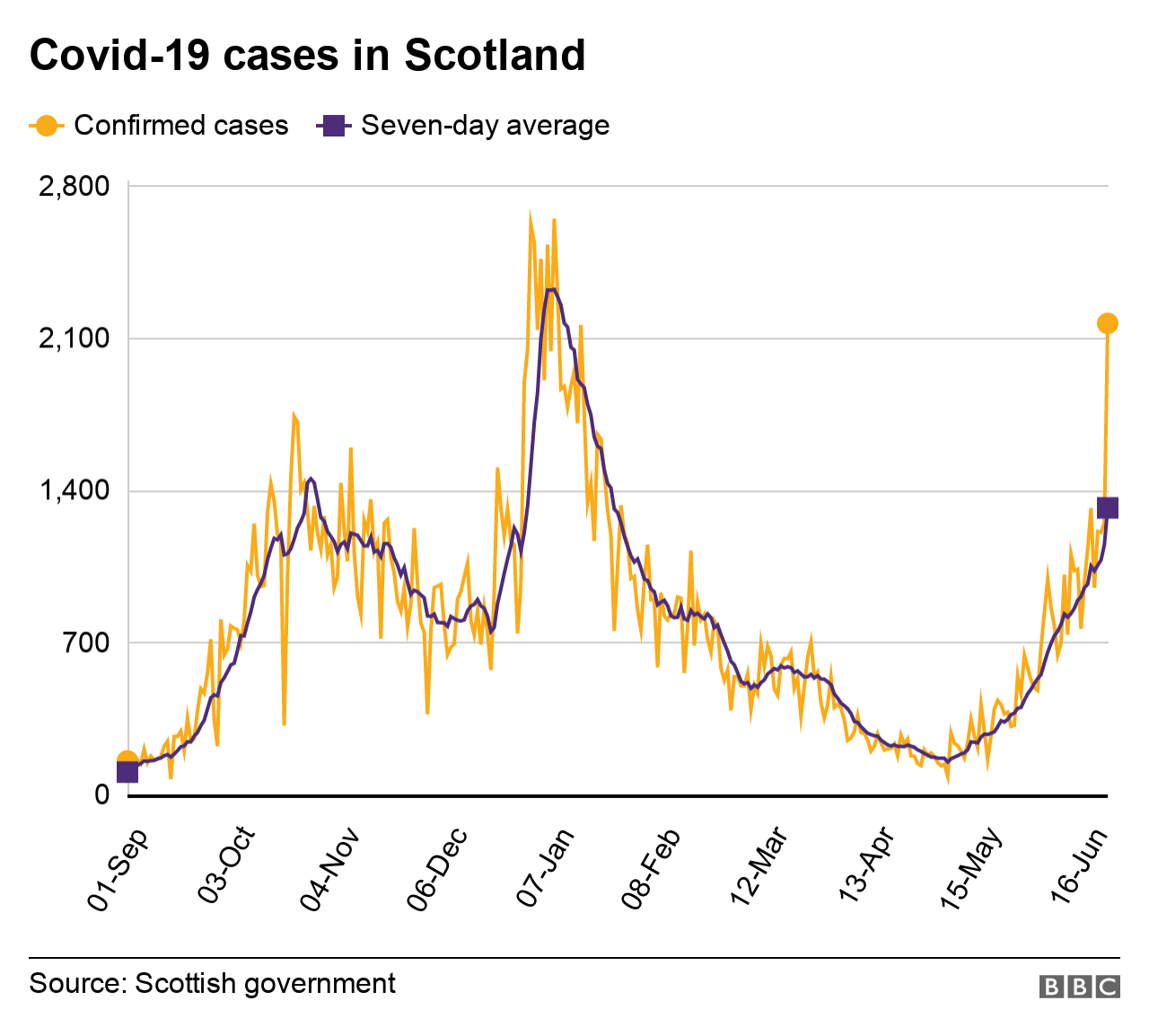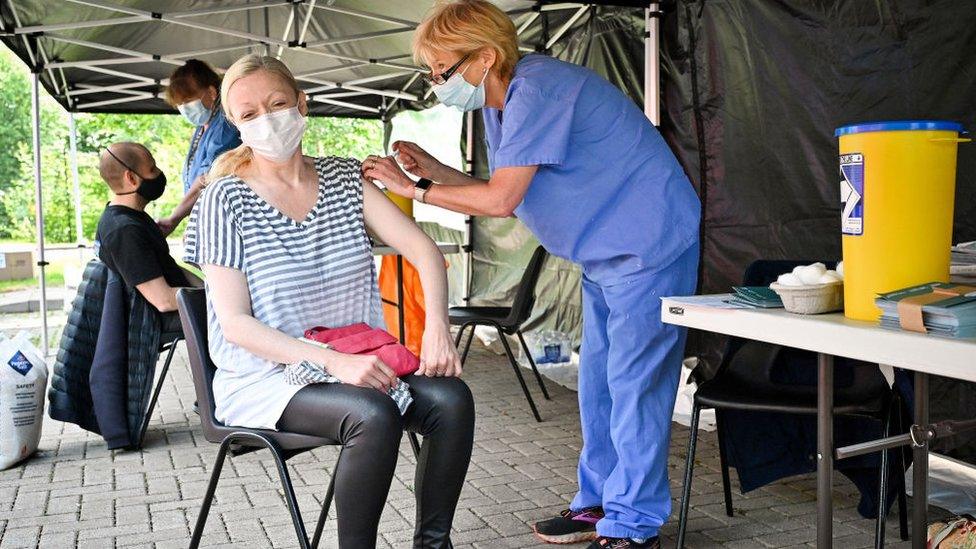Scotland aiming to lift all Covid restrictions by 9 August
- Published
- comments

Scotland is aiming to remove all of its major legal Covid restrictions in early August, the country's first minister has announced.
Nicola Sturgeon was speaking as she confirmed lockdown easing would be paused for three weeks to allow more time for people to be vaccinated.
It means mainland areas will not move to the lowest level zero restrictions until 19 July.
The hope is that the remaining rules will be lifted on 9 August.
Ms Sturgeon said this would allow life in Scotland to return to "almost complete normality".
But the government will not advise an immediate return to full office working on that date - and people will still be required to wear face masks in some settings.
Scotland recorded 2,167 new cases on Monday - the highest daily total since the peak of the second wave in January - with the country said to have had the highest rate in Europe last week
The percentage of Covid-19 tests coming back positive rose to 9.1%, up from 7.2% the previous day, and the deaths of a further four people who had tested positive for the virus have been recorded.
The UK as a whole recorded 11,625 new cases and 27 deaths in the past 24 hours.
The new daily case rate in Scotland is seven times higher than it was in early May and 40% higher than last week, with Ms Sturgeon saying the faster-transmitting Delta variant is "now dominant".
But the first minister said the vaccination programme was breaking the link between the number of positive cases and the number of people being hospitalised and dying.
The government's original "route map" out of lockdown would have seen the whole of Scotland move to level zero - the lowest point in the five-tier system of restrictions - from next Monday.
This has now been pushed back to 19 July - the same date as measures are planned to be lifted in England.
Island communities such as Orkney, Shetland and the Western Isles are already in level zero, with all mainland areas in level one or level two of the country's five-tier system of restrictions.

Some "minor" changes will be phased in sooner - removing staff and suppliers of wedding services from the cap on numbers at services from Monday and allowing live entertainment at receptions, and allowing people from more than one household to help carry a coffin at a funeral.
The move to level zero will increase the number of people who are allowed to meet up indoors, cut the requirement for physical distancing indoors from 2m (6.5ft) to 1m (3.2ft), and increase the number of people allowed to attend wedding and funerals to 200.
Ms Sturgeon said this would be a "significant step back to normality", but said she wanted to move beyond level zero "as quickly as it is prudent to do so".
She said the "major remaining legal restrictions" could be lifted from 9 August, signalling a "return to almost complete normality in our day to day lives".
Ms Sturgeon added: "We will consider and make a final assessment nearer the time of whether - as we hope - this could include the lifting of the legal requirement to physically distance indoors as well as outdoors."
However she warned that some measures, including the use of face coverings in shops and on public transport and "rigorous and regular hand-washing" would be needed "at least for a period".
And the first minister said there should be "appropriate phasing" of the return of workers to offices after 9 August, saying the government would "encourage continued support for home working where it is possible".


The first minister has always said that Covid restrictions would be driven by the data, not by dates.
But Nicola Sturgeon has announced that Scotland can expect to be in level zero from 19 July, and that all major legal restrictions could be lifted from 9 August.
Looking at the raw data, this might seem surprising. There are 154 new coronavirus cases a day in Scotland per 100,000 people. That's almost twenty more than the daily rate on Boxing Day, when the country went into another lockdown.
The difference is the vaccine, which has dramatically reduced the consequences of catching coronavirus. Fewer people are now dying from Covid, down from an average of 31 a day in December to less than 2 a day now.
That's why the Scottish government can look forward to a date when it can relax restrictions instead of imposing them.

The changes are dependent on case levels being suppressed and targets being hit in the vaccination programme.
All adults in Scotland will have had at least one dose of a vaccine by 18 July, with everyone in the 40-49 age group due to have had both doses by a week later.
By 20 August, all 30 to 39-year-olds will have had a second dose, with everyone over the age of 18 due to have had two doses by 12 September.

More than 2.6 million people in Scotland have had both doses of a vaccine
Ms Sturgeon faced questions on her statement from opposition leaders at Holyrood - where MSPs are due to debate an extension of emergency powers into 2022.
Scottish Conservative leader Douglas Ross welcomed progress with the vaccination programme and that "we have more of an indication of when we will be free from restrictions".
He pressed Ms Sturgeon for more detail about what measures would continue after 9 August, including whether masks would still be required in offices and schools.
Ms Sturgeon said the legal requirement for physical distancing could be removed at that point, but that in some settings - such as schools - masks may need to be worn for a bit longer.
Scottish Labour leader Anas Sarwar said "we must make sure the last lockdown really was the last lockdown", calling for clearer messaging and protocols around financial support.

